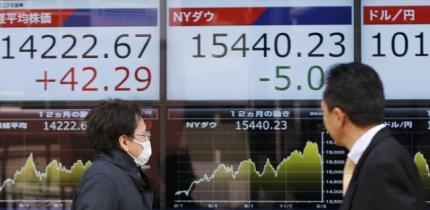Emerging investors watch ECB, US Treasuries; dollar debt spr
• 04 Jun 2014

Pedestrians walk past electronic boards showing the Nikkei, DJIA and the exchange rates between the yen and the dollar, in Tokyo (REUTERS/Toru Hanai )
MSCI's emerging index rose 0.4 percent but stayed off 6-1/2 month highs while China finished 0.3 percent lower
Bareksa.com - Emerging sovereign dollar bonds traded at the lowest yield premia to U.S. Treasuries since February 2013 on Tuesday, while inflation optimism helped India and Turkey outperform in local currency debt markets.
Most emerging assets were rangebound, however, taking off the Chinese government's recent stimulus announcements and better economic data in stride. Instead, focus was on U.S. Treasury yields, which rose above 2.5 percent for the first time in a week.
This year's rally in U.S. Treasuries has been partly behind emerging markets gains that took emerging stocks to 6-1/2 month highs and fuelled 8.5 percent year-to-date returns in emerging dollar debt.
The latter, as measured on EMBI Global dollar bond index saw spreads tighten 2 basis points to 287 bps, the tightest in 15 months, having rallied 30 bps since early May and outperforming U.S. Treasuries.
"If U.S. yields pick up in the next few months, we may see spikes (on emerging debt yields) but there is so little supply in this market relative to potential demand that on a multi-month basis spreads may contract further," said Simon Quijano-Evans, head of emerging markets research at Commerzbank.
While many emerging governments and firms - South Korea, Morocco, Russia's Alfa Bank, Polish utility PGE and Turkey's Vkifbank - are looking to tap markets, Russian and Ukrainian borrowers have been absent from primary markets this year.
Most other emerging assets were rangebound before a European Central Bank meeting that is expected to deliver significant policy easing on Thursday.
Quijano-Evans said, however, focus would stay on Treasuries , with Friday jobs data likely to set the direction.
"Emerging markets will trade on the ECB's announcement but ultimately, unless it disappoints massively, it won't be the main driver for EM, it's going to be U.S. yields," he added.
MSCI's emerging index rose 0.4 percent but stayed off 6-1/2 month highs while China finished 0.3 percent lower
New index members, Qatar and United Arab Emirates however continued to fall. Qatar plunged 3 percent due to question marks over its hosting of the soccer World Cup in 2022.
INDIA, TURKEY
The bright spots were India, Turkey and central Europe.
Indian equities jumped 0.6 percent as the central bank took a dovish tone at its meeting and cut some bank liquidity ratios but the index failed to advance towards the record highs hit after last month's election.
Indian bonds rallied too, with the benchmark 10-year rupee yield down 11 bps on the day to 5-1/2 month lows
"We are pleasantly surprised with RBI's stance on policy easing if inflation falls faster than anticipated. I think market should take it as a very strong message and hence unless there are some external oil price or food shocks, we should see bond yields headed lower," said Arvind Chari, head of fixed income at Quantum Advisors in Mumbai.
In Turkey, May inflation stayed above-target but rose less than expected, pushing benchmark yields to seven-month lows around 8.36 percent.
Poland's central bank is expected keep to interest rates steady at 2.5 percent though eyes will be on post-meeting comments on inflation which is running at just 0.3 percent.
Yields across the region have tumbled, with Hungarian and Polish 10-year yields down 90 and 60 bps respectively in 2014.
Quijano-Evans of Commerzbank said the impact of ECB easing would be most felt in these countries, with monetary policy likely to be eased more than earlier anticipated.
"Whatever the ECB decides, we will see central banks in CEE becoming more dovish, otherwise the currency appreciation effect will be quite strong, given the relative spread pickup between ECB rates and their own," he added. (Source : Reuters)